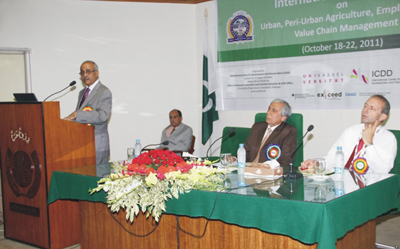International Conference on 'Urban, Peri Urban Agriculture: Empowerment and Value Chain Management'

UAF Vice Chancellor Prof Dr Iqrar Ahmed Khan addresses International Conference on Urban, Peri Urban Agriculture while Pakistan Atomic Energy Commission Chairman Dr Ansar Pervez is also seen in pic
|
|
The 70 percent population of the world will shift to cities by 2030 that will cause many crises including food security, increasing pollution and health hazards for the developing countries like Pakistan, said Pakistan Atomic Energy Commission Chairman Dr Ansar Pervez. He was addressing an International Conference on Urban, Peri Urban Agriculture: Empowerment and Value Chain Management arranged by the University of Agriculture, Faisalabad at New Senate Hall on Wednesday. The event was part of four-day Rabi Festival that was opened at the campus. As many as agriculture scientists from ten countries participated in it.
He said the country is becoming worst victim of climate changes as rapidly floods are not only playing havoc with the food security but also responsible for killing many lives. He said we have to work on war footing to conserve the water by developing reservoirs in order to save the lives and agriculture. He said the step would also help fight the energy crisis that has become hot issue of the country. The proper planning is a key to overcome all crises, he said, adding that China which is housing a large population has emerged as second biggest economy of the world.
Addressing the audience, UAF Vice Chancellor Prof Dr Iqrar Ahmed Khan while stressing the need to make Pakistan food secure country said that the country is confronting many challenges and one of the most important issues is food insecurity caused by climate changes and floods. Now, the challenge lies on the shoulder of agri scientists and policy makers to avert the crises by mapping out a comprehensive plan to fight the curse of hunger.
He said that population of world is around 6.8 billion while the globe population by 2050 will reach 9.4 billion so it is the need of the hour to take tangible measures by increasing the per acre production and promote the new techniques of agriculture in the country. He lauded the steps being taking on the part of the commission in order to strengthening defence and development of the country.
Prof Dr Andreas Buerkert from Germany briefing the audience about the International Center for Development & Decent Work (ICDD) said that it is a global think tank network working on eradicating extreme poverty & hunger. He said urban and peri-urban agriculture (UPA) can make an important contribution to supplying food and income opportunities to the rapidly growing urban populations of developing countries.
He said a thorough understanding of the biophysical, economic and social sustainability of UPA systems may also allow us to derive important conclusions for the farm-level adoption of improved soil fertility management options in the vast rainfed systems across semi-arid Africa and parts of Asia.
Ms Urshula Saarbeck briefing the audience about DAAD, a German Academic Exchange Service, said they are working with 229 universities in Germany providing scholarship for PhDs and Master programme across Pakistan. In the programme, the UAF is one of the six partner universities working on the programme. She said that areas of scholarships include Public Policy and Good Governance, Conflict Studies and Management etc. She said they are setting up Excellence Center for Development Cooperation in Pakistan to facilitate the people with scholarships etc.
Dr. Job Kibiwot Lagat from Kenya spoke about an overview of ICDD program in Kenya. Eva Schlecht from University of Kassel said that Pakistan is getting 20 percent of milk from peri urban produces. Giving details, Eva said that in 1998, Pakistan was producing 7 billion tonnes of milk but now the figure has gone up to 12 billion tonnes.
Later on, Dr Ansar inaugurated the agricultural exhibition set up at the campus as part of four-day Rabi festival in order to celebrate golden jubilee festivities. Prof Dr Mariano F Laplane from Brazil, Prof Francisco Solorio from Mexico Dr Kevin D Gallagher from FAO Pakistan, Dr Muhmmad Ashfaq Chairman Department of Agri Economics and Dr Asif Ali Director, ORIC also spoke on the occasion.
|
|
|